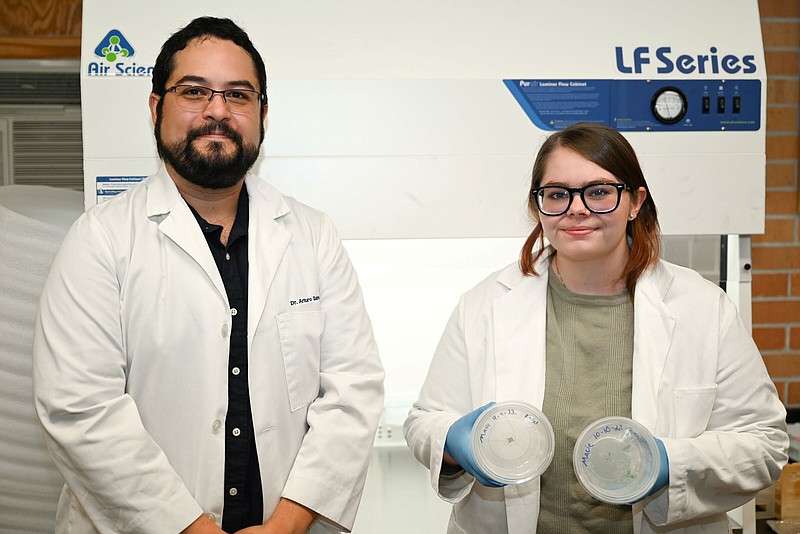This semester at the University of Arkansas at Monticello, under the direction of Assistant Professor Arturo Quintero Ferrer, students have successfully experimented with tissue culture using potato plants in a biology lab.
In 2021, Quintero Ferrer joined UAM’s faculty as an assistant professor of biology in the UAM School of Mathematical and Natural Sciences. His expertise is in genetics and synthetic biology, and one of his research focuses is in plant pathology, according to a news release.
He is the owner and chief executive officer of PlanTech, a plant biotechnology lab at Guadalajara in Jalisco, Mexico. He founded the agency in 2016. The lab offers products and services to the state of Jalisco and is currently working with potato and agave plants, providing growers with certified seed that is lab-confirmed to be pathogen-free.
Quintero Ferrer plans to bring similar plant biotechnology to UAM.
“With this type of lab, UAM students would not only learn about how the agriculture industry’s seed certification process happens, but they would also experience it,” Quintero Ferrer said.
Quintero Ferrer previously worked on potato seed certification at the University of Idaho. During the past year, he has brought his expertise to his lab at UAM. His current student lab interns are learning to implement medical and molecular techniques to clone plants.
The primary student researchers for the project include Kaylee Beck, an agriculture major from Hamburg, and Macie Carter from East End, who has a double major in pre-medical biology and biochemistry.
After purchasing a potato from a grocery store, students test it in the lab to confirm that it is pathogen-free. Upon confirming that the seed is clean, students establish the plant in vitro by putting it in media to germinate.
After germination occurs, students micropropagate, or clone, the clean plant by cutting it and reestablishing each new piece in the media. This process ensures that each plantlet, known as an explant, that they create from the original potato plant is genetically the same, and the seed can be certified as clean, according to the news release.
Quintero Ferrer has been working for more than 10 years with certified seed projects. He aims to develop a lab that is self-sufficient, providing academic and economic benefits.
“I would like to create an academic experience that is active,” he said. “I want students to participate in active learning and be exposed to real-world projects. Working in a lab like this one offers students many opportunities, and they gain hands-on experience that can make them attractive to future employers.”
He plans to expand the lab’s scope to work with Arkansas-grown, state-relevant crops, such as tomatoes and rice.
“In the future, we may be able to offer products to growers in the state, such as seed-certified plants, as well as phytopathological services,” Quintero Ferrer said.
Shuneize Slater is dean of the UAM School of Mathematical and Natural Sciences.
“We are very excited about this opportunity for our students and the possibility of future interdepartmental collaboration,” Slater said. “It will be an excellent research project for all of us.”
Details: UAM School of Mathematical and Natural Sciences, Shuneize Slater, (870) 460-1116.
